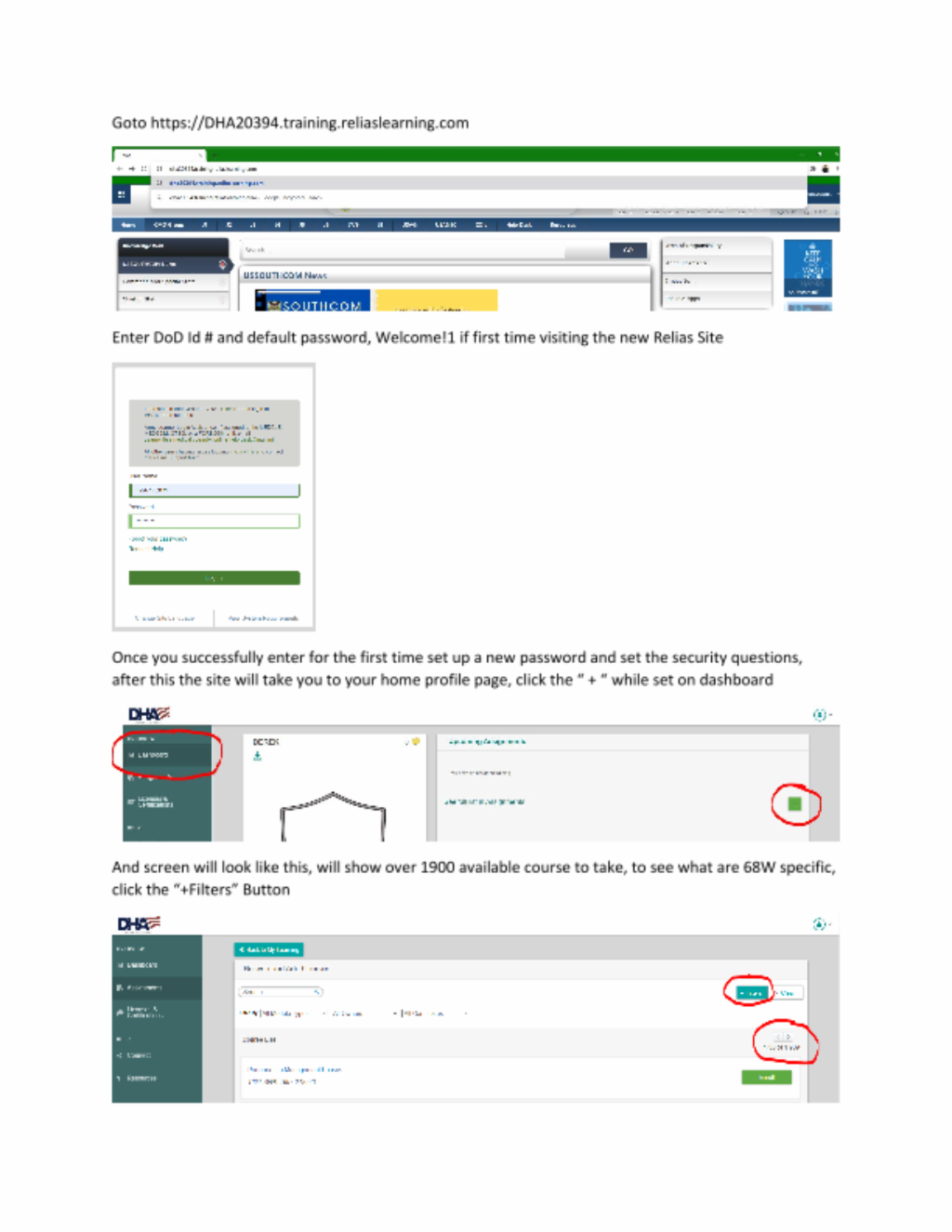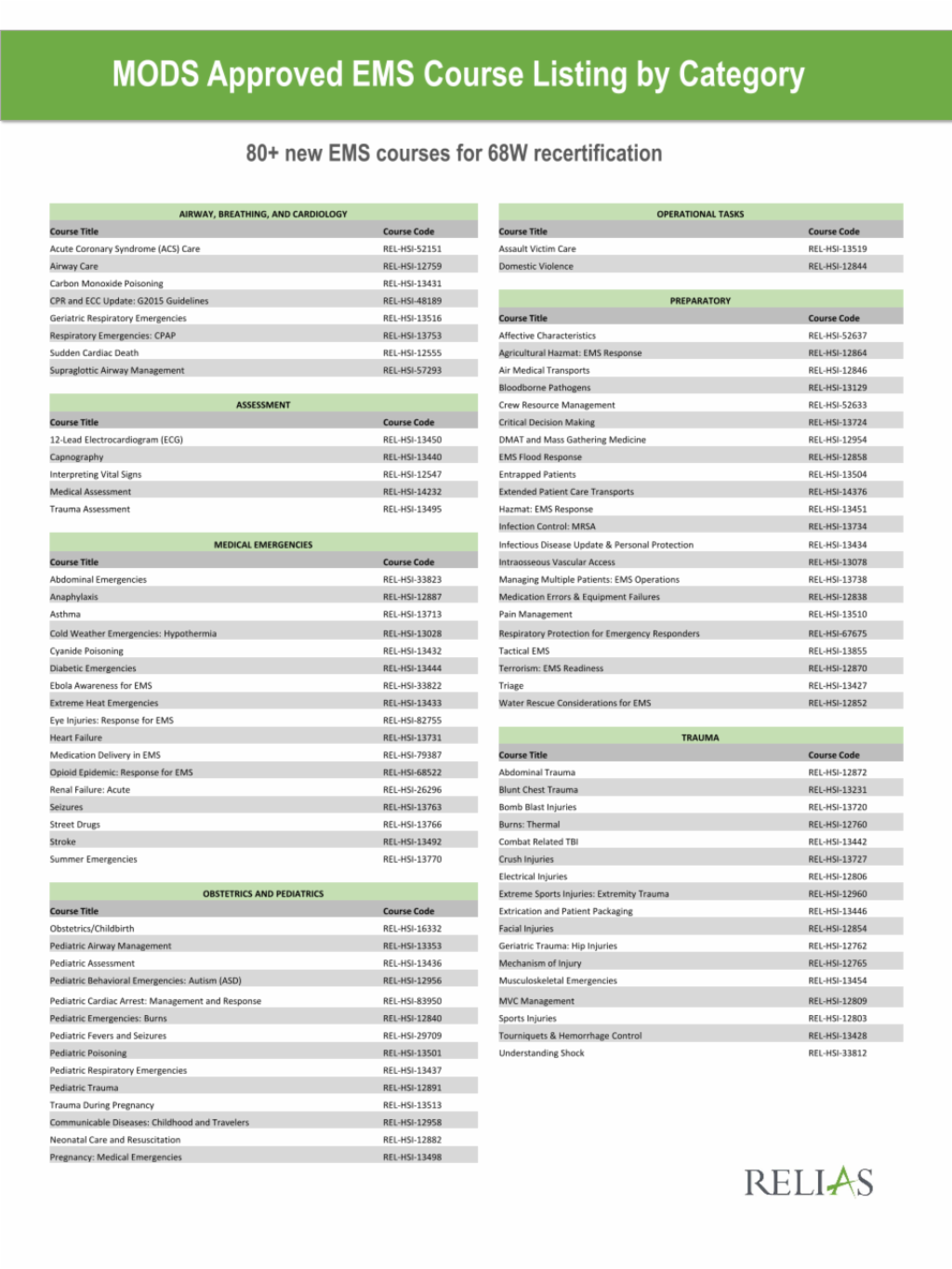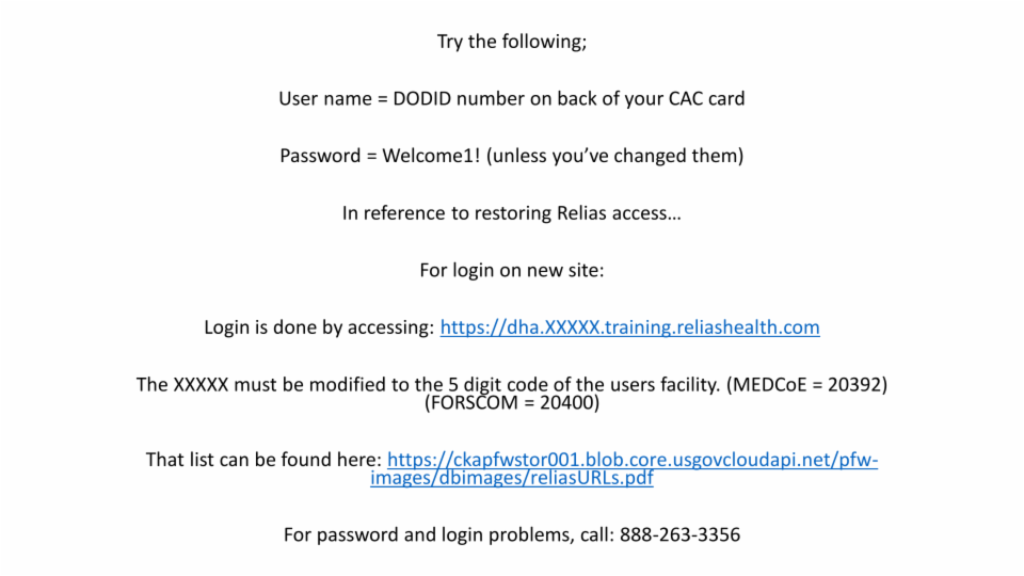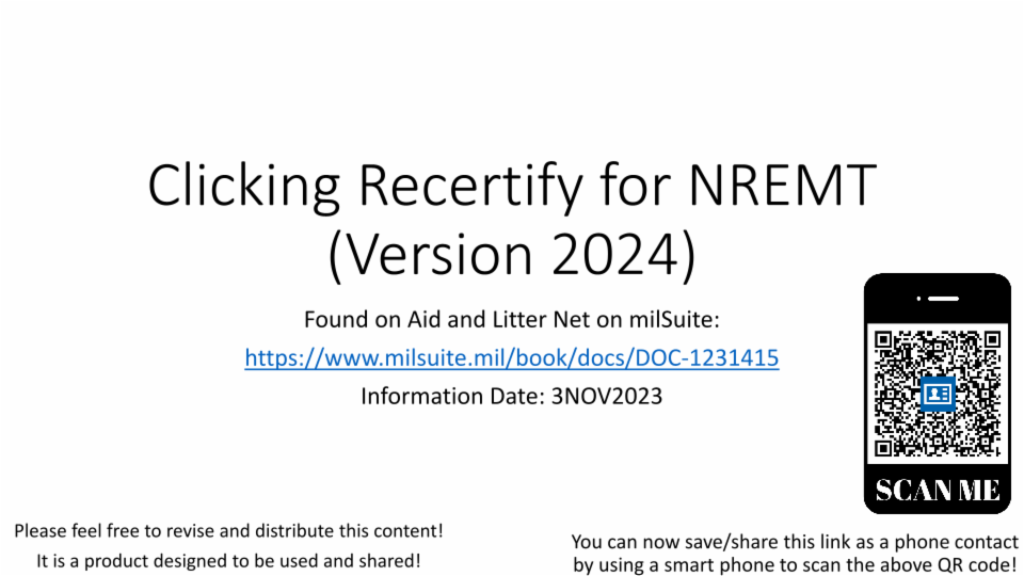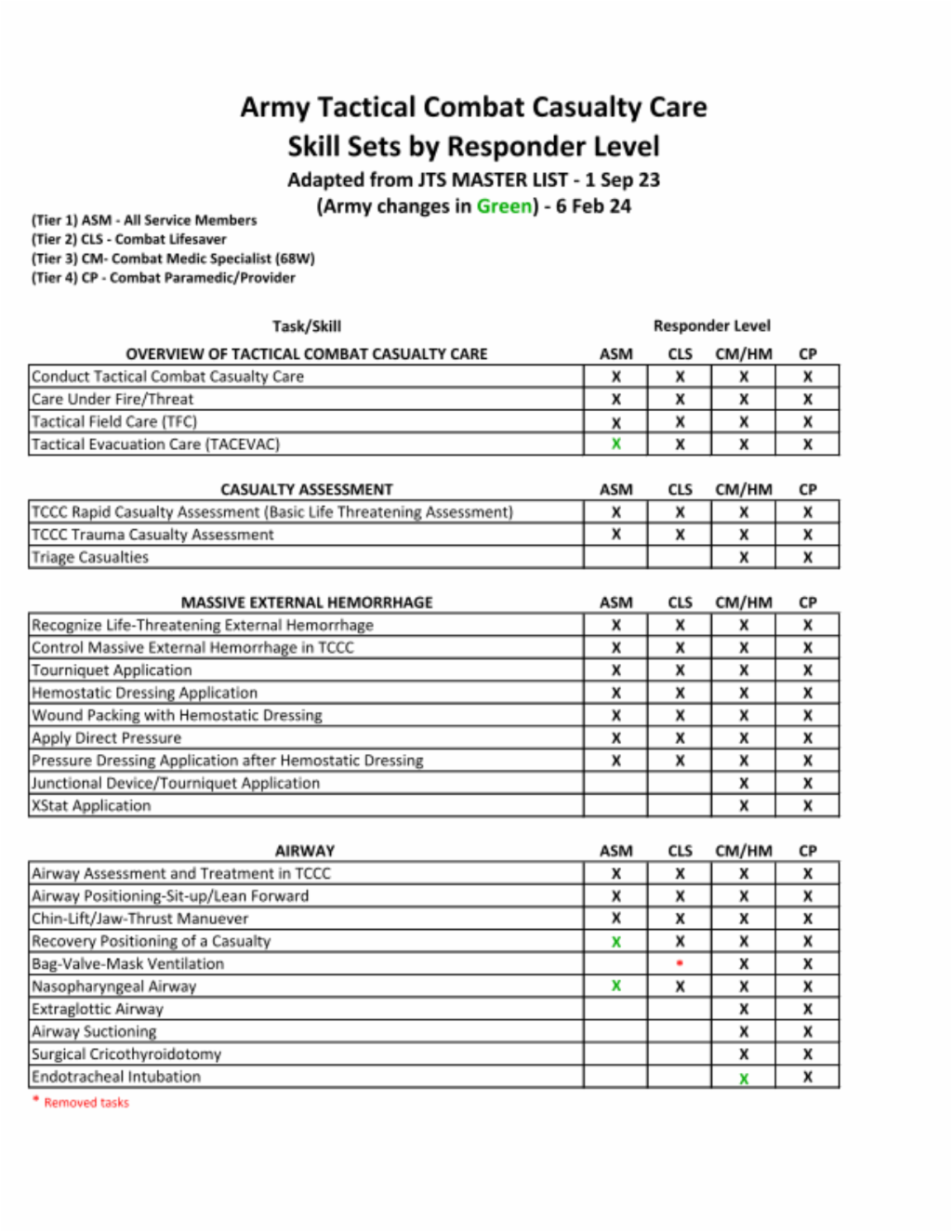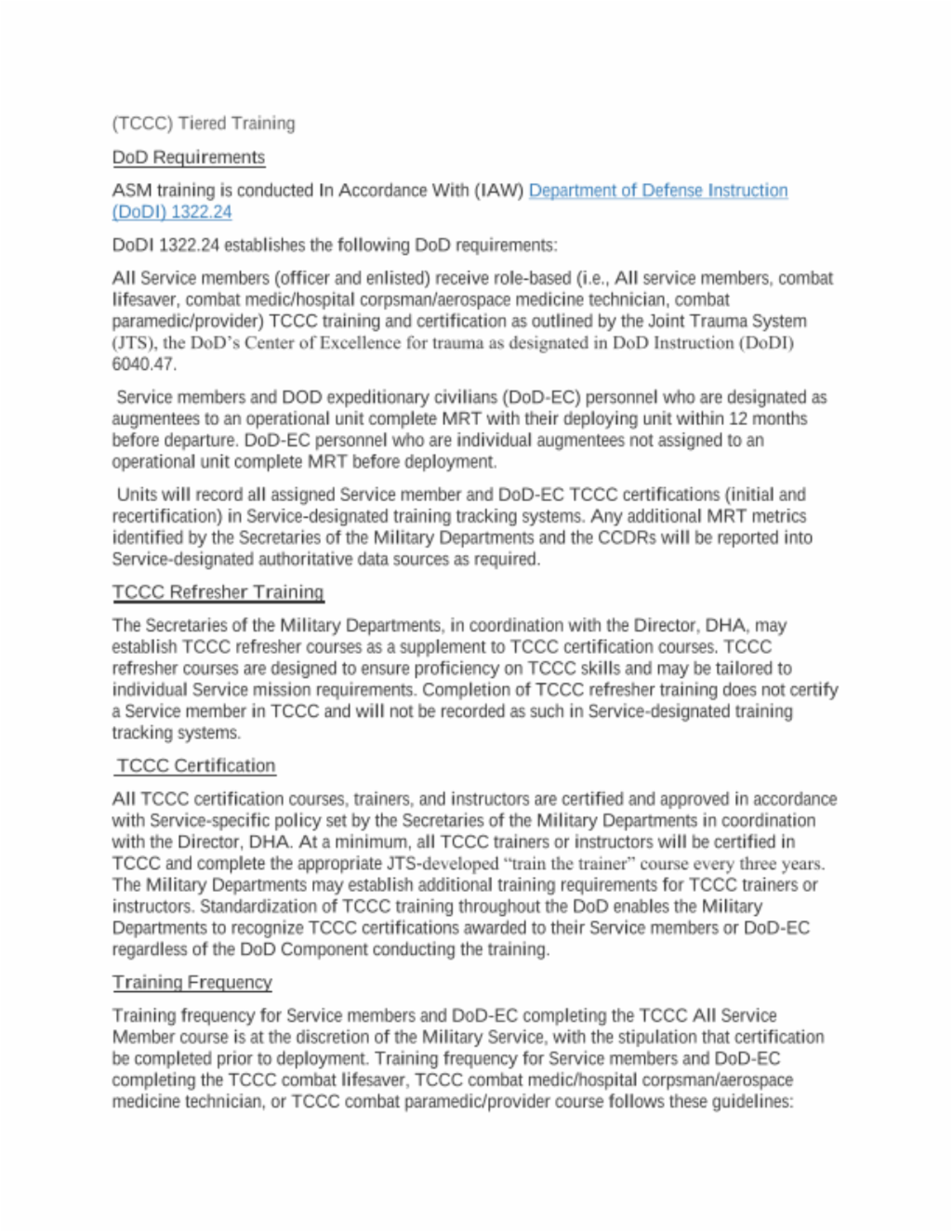Army Standards for Executing DoD Medical Readiness Training (MRT) Tactical Combat Casualty Care (TCCC) Tiered Training
Joint Trauma System
Tactical Combat Casualty Care (TCCC) Tiered Training
DoD Requirements
ASM training is conducted In Accordance With (IAW) Department of Defense Instruction (DoDI) 1322.24
DoDI 1322.24 establishes the following DoD requirements:
All Service members (officer and enlisted) receive role-based (i.e., All service members, combat lifesaver, combat medic/hospital corpsman/aerospace medicine technician, combat paramedic/provider) TCCC training and certification as outlined by the Joint Trauma System (JTS), the DoD’s Center of Excellence for trauma as designated in DoD Instruction (DoDI) 6040.47.
Service members and DOD expeditionary civilians (DoD-EC) personnel who are designated as augmentees to an operational unit complete MRT with their deploying unit within 12 months before departure. DoD-EC personnel who are individual augmentees not assigned to an operational unit complete MRT before deployment.
Units will record all assigned Service member and DoD-EC TCCC certifications (initial and recertification) in Service-designated training tracking systems. Any additional MRT metrics identified by the Secretaries of the Military Departments and the CCDRs will be reported into Service-designated authoritative data sources as required.
TCCC Refresher Training
The Secretaries of the Military Departments, in coordination with the Director, DHA, may establish TCCC refresher courses as a supplement to TCCC certification courses. TCCC refresher courses are designed to ensure proficiency on TCCC skills and may be tailored to individual Service mission requirements. Completion of TCCC refresher training does not certify a Service member in TCCC and will not be recorded as such in Service-designated training tracking systems.
TCCC Certification
All TCCC certification courses, trainers, and instructors are certified and approved in accordance with Service-specific policy set by the Secretaries of the Military Departments in coordination with the Director, DHA. At a minimum, all TCCC trainers or instructors will be certified in TCCC and complete the appropriate JTS-developed “train the trainer” course every three years. The Military Departments may establish additional training requirements for TCCC trainers or instructors. Standardization of TCCC training throughout the DoD enables the Military Departments to recognize TCCC certifications awarded to their Service members or DoD-EC regardless of the DoD Component conducting the training.
Training Frequency
Training frequency for Service members and DoD-EC completing the TCCC All Service Member course is at the discretion of the Military Service, with the stipulation that certification be completed prior to deployment. Training frequency for Service members and DoD-EC completing the TCCC combat lifesaver, TCCC combat medic/hospital corpsman/aerospace medicine technician, or TCCC combat paramedic/provider course follows these guidelines:
(1) All active Component Service members and some DoD-EC personnel as defined by job or unit, will complete TCCC recertification at least every three years following initial certification. Military Services should consider implementing the triennial certification requirement for RC Service members assigned to rapidly deployable units.
(2) Service members and DoD-EC will certify in TCCC within 12 months of deployment. For personnel who deploy more than once during a 12-month period, certification in TCCC remains current if completed within 12 months of the most recent deployment date.
Tier 1 All Service Member (ASM) Training for Army Personnel
DoD Requirements
ASM training is conducted In Accordance With (IAW) Department of Defense Instruction (DoDI) 1322.24.
DoDI 1322.24 establishes the following DoD requirements:
All Service members (officer and enlisted) that have not completed Combat Lifesaver Course, Combat Medic / Corpsman, or Combat Paramedic / Provider training are considered Tier 1 and will complete Tier 1 TCCC for Army Personnel IAW training and certification as outlined in the JTS’s TCCC skills list. Units will record all assigned Service member and DoD-EC TCCC certifications (initial and recertification) in Service-designated training tracking systems (Army Digital Training Management System (DTMS)).
The Joint Trauma System published DoDI 1322.24 which identified the basic skills for all Service members. DoDI 1322.24 gave the individual services the latitude to expand their specific requirements, the U.S. Army has identified additional Tier 1 and Tier 2 skills above the skills identified in DoDI 1322.24.
The U.S. Army system of record for documenting all training is the Digital Training Management System (DTMS). All course and task completion must be entered into DTMS, until such time as it is replaced by the Army Training Information System.
The Medical Center of Excellence (MEDCoE) continually reviews and revises all applicable initial entry training (IET) and initial military training (IMT) medical lesson plans to ensure TCCC-ASM requirements are met. If, for any reason, a Soldier is not certified within IET or IMT, the Soldier will receive certification at their first unit of assignment.
Per DoDI 1322.31, TCCC-ASM training frequency is at the discretion of the Military Service, with the caveat that all Service members be trained prior to deployment. In addition to the pre-deployment training requirement, the TCCC-ASM recertification and refresher for Component (Compo) 1 Active Army is annually required, Compo 2 Reserve Component and Compo 3 National Guard requirement is biennial.
Army Requirements
The Army has not issued an ALARACT for conducting Tier 1 ASM training.
The Army specific task, conditions, standards, and performance steps for required tasks can be found on the Army Training Network (ATN) website. See the below table for required recertification and refresher tasks for Army personnel.
- 081-COM-0101 Request Medical Evacuation
- 081-COM-1001 Perform Casualty Care
- 081-COM-1002 Perform Hemorrhage Control
- 081-COM-1006 Perform Open Chest Wound Care
- 081-COM-1007 Perform Casualty Burn Care
- 081-COM-1008 Treat an Eye Injury
- 081-COM-1009 React to Nerve Agent Poisoning
- 081-COM-1046 Perform Casualty Movement
- 081-COM-1053 Apply Individual Preventive Medicine Countermeasures
- 081-COM-1055 Apply a Rigid Eye Shield
This training is intended for initial certification but can be modified for refresher training.
- Will follow the course map from Deployed Medicine.
- Initial Military Entry Training (IMET) Instructors will follow the IMET lesson plans which may be supplemented by Deployed Medicine resources.
Certification training or a refresher course, based on the requirements mentioned in the training frequency section, will be conducted during pre-deployment training. The course content from Deployed Medicine website https://deployedmedicine.allogy.net/learner/collections/171 will be used at a minimum. Additional course content can be added based on the units METL and the operational environment.
ALL ASM Students MUST:
- There are no prerequisites for this course. The course can be taught to all Service members but is primarily intended for nonmedical personnel.
All ASM trainers MUST:
- Be certified in TCCC and complete the appropriate JTS-developed “train the trainer” course every three years (DoDI 1322.24 Requirement)
- Successfully complete the classroom-based TCCC ASM Course. (JTS/DHA requirement)
- Successfully complete five online train-the-trainer video tutorials TCCC-ASM Train-the-Trainer Online Course (JTS/DHA requirement)
- Be proctored and signed off by medical personnel on a periodic basis verifying their ability to train servicemembers in ASM for quality assurance purposes. (JTS/DHA requirement)
- IMET Instructors must complete the Common Faculty Development-Instructor Course (CFD-IC), Drill Sergeant Course. (Army Requirement)
Tracking Training and Course Completion Credit
Units will record all initial and recertification training in the Army Digital Training Management System (DTMS). There is no DTMS code for Tier 1 training currently.
Training Frequency
Training frequency for Service members and DoD-EC completing the TCCC All Service Member course is at the discretion of the Military Service, with the stipulation that certification be completed prior to deployment. Training frequency for Service members and DoD-EC completing the TCCC combat lifesaver, TCCC combat medic/hospital corpsman/aerospace medicine technician, or TCCC combat paramedic/provider course follows these guidelines:
(1) All active Component Service members and some DoD-EC personnel as defined by job or unit, will complete TCCC recertification at least every three years following initial certification and within 12 months of deployment. For personnel who deploy more than once during a 12-month period, certification in TCCC remains current if completed within 12 months of the most recent deployment date. (DoDI 1322.24 Requirement)
All Service Member task requirements are accomplished through the completion of STP 21-1-SMCT, Section 5, Medical Common tasks (081-COMxxx) annually or biennially (COMPO II/III) (AR 350-1).
ASM Initial and Recertification Training
Training on ASM skills using the current, standardized curriculums developed by the JTS, DHA at the appropriate interval (every three years) after a Service member or DoD-EC initially certifies in TCCC. (DoDI 1322.24 Requirement)
- Soldiers should review ASM course content prior to beginning the training which will be conducted over six-eight hours. (DHA/JTS Requirement)
- Will follow, at a minimum, the course map from Deployed medicine (DHA/JTS Requirement)
- Recertification is valid for three years (DHA/JTS Requirement)
- Practical exercise and validation of skills is required. (DHA/JTS Requirement)
ASM Refresher Training
ASM refresher courses are a supplement to ASM certification courses. ASM refresher courses are designed to ensure proficiency on TCCC skills and may be tailored to individual Service mission requirements. Completion of ASM refresher training does not certify a Service member in TCCC and will not be recorded as such in Service-designated training tracking systems. (DoDI 1322.24 Requirement)
- Soldiers should review course content prior to beginning the refresher training which will be conducted over one day.
- Day one: training knowledge overview, skills practice, and skills validation.
- Practical exercise and validation of skills is required.
- Evaluation scenario(s) must be performed in a unit METL supported task and must evaluate all Tier 2 CLS critical tasks
- Refresher is valid for one year.
Tier 2 Combat Lifesaver Course (CLS) Training for Army Personnel
DoD Requirements
DoDI 1322.24 establishes the following DoD requirements:
All Service members (officer and enlisted) will complete appropriate role-based (i.e., All Service Members, combat lifesaver, combat medic/hospital corpsman/aerospace medicine technician, combat paramedic/provider) TCCC training and certification as outlined in the JTS’s TCCC skills list. TCCC certification may be categorized as either an initial certification or recertification.
Passing the CLS Exam is a component of completing CLS training but does not make a trainee CLS-certified. CLS Certification also includes performance evaluation.
Army Requirements
Each squad, crew, or equivalent-sized deployable unit will have at least one member certified as a CLS. CLSs must be recertified every 12 months at unit level. Corps, divisions, and brigades will implement CLS training within their commands and designate a staff surgeon responsible for supervising their CLS programs (AR 350-1).
The Army has issued a Training Support Package (TSP) on the Central Army Registry (CAR) for conducting Tier 2 CLS training. Additional Service specific information beyond the DHA produced joint courses hosted on Deployed Medicine must be taught during CLS. CLS trainers must use the Central Army Registry (CAR) CLS Training Support Package (TSP). Download part 1 and part 2 of the CLS TSP. These are the Army requirements for conducting CLS training to AR 350-1 standards annotated in the MEDCoE Distance Learning (DL) CLS ATRRS course description and the CLS TSP coordinating instructions 081-CLS-0001 / 1.4 approved 23 Sep 2022.
This training is intended for initial certification 5 days/40 hours and WILL NOT be condensed but can be modified for refresher training.
- The initial course will be 40 hours.
- Will follow the course map from Deployed Medicine.
- Written examination (online only) is required.
- Practical exercise and validation of skills is required.
- Certification is valid for one year.
- Day one: training knowledge overview, and skills practice.
- Day two: practical exercise and skills validation.
Soldiers should review course content prior to beginning the refresher training which will be conducted over two days.
A refresher course will be conducted annually or for pre-deployment. Battalion or brigade senior 68W, Combat Medic Specialist, will coordinate all Tactical Combat Casualty Care (TCCC), Combat Life Saver (CLS) training, materiel, and equipment to conduct CLS classes tailored to the unit’s requirements. The course content from Deployed Medicine website and the TSP will be used at a minimum. Additional course content can be added based on the units METL and the operational environment.
ALL CLS Students MUST:
- Complete the All Service Members (ASM) course prior to class or to those whose Service-specific requirements begin with CLS as a foundational level of training.
All CLS trainers MUST:
- Be certified in TCCC and complete the appropriate JTS-developed “train the trainer” course every 3 years (DoDI 1322.24 Requirement)
- Complete and pass the CLS Student’s Course. (JTS/DHA requirement)
- Complete the CLS Train the Trainer Course prior to beginning the course. (JTS/DHA requirement)
- Be medical providers i.e., Medics/Corpsman, Flight Paramedic etc (JTS/DHA requirement)
- Be qualified to provide medical care at or higher than the level of care they wish to train others at. (JTS/DHA requirement)
- Be a medical NCO, 68W, current in CLS certification. (AR 350-1 requirement)
- Ensure the primary instructor at the division or brigade is a Senior Medical NCO and the primary instructor at the battalion is at least an E-6/SSG. (ICT: 081-68W-2003 Manage a CLS Program)
- Be fully Military Occupational Specialty qualified and have maintained the 68W for a period of at least one year. (ICT: 081-68W-2003 Manage a CLS Program)
- Be basic life support certified. (ICT: 081-68W-2003 Manage a CLS Program)
- Have an initial instructor evaluation completed (by the Course Manager or Medical Director) no later than 30 days prior to the start of instruction. (ICT: 081-68W-2003 Manage a CLS Program)
- Have completed TC 8-800 (or equivalent) within the last twelve months. (ICT: 081-68W-2003 Manage a CLS Program)
- Be placed on additional duty orders. (ICT: 081-68W-2003 Manage a CLS Program)
- Be trained on equipment, course material and requirements. (ICT: 081-68W-2003 Manage a CLS Program)
Tracking Training and Course Completion Credit
Units will record all assigned Service member and DoD-EC TCCC certifications (initial and recertification) in Digital Training Management System (DTMS). There is no DTMS code for Tier 2 training currently. Soldiers will take a copy of the initial certificate signed by an 05 or above to their S-1 for inclusion into their personnel records.
ATRRS credit requests must be sent through the designated email inbox using the Instructions for CLC Instructors as of 1 Nov 22
Send student rosters via encrypted email via DoD SAFE to usarmy.jbsa.medical-coe.mbx.online-help-desk@army.mil. DoD SAFE https://safe.apps.mil
The Army Training Requirements and Resource System (ATRRS), CLS Enrollment Information for Course Number: 081 F31 (CLC) (School Code: 555) can be found here.
Points of Contact: MEDCoE ITSSS HELPDESK (Enrollment and Graduation Support) at (210) 221-6888 (888) 263-3356 (DSN: 471-6888) or the Department of Combat Medic Education (Course Content Support) at (210) 221-3708 (DSN: 471-3708).
Training Frequency
Training frequency for Service members and DoD-EC completing the TCCC All Service Member course is at the discretion of the Military Service, with the stipulation that certification be completed prior to deployment. Training frequency for Service members and DoD-EC completing the TCCC combat lifesaver, TCCC combat medic/hospital corpsman/aerospace medicine technician, or TCCC combat paramedic/provider course follows these guidelines:
(1) All active Component Service members and some DoD-EC personnel as defined by job or unit, will complete TCCC recertification at least every 3 years following initial certification and within 12 months of deployment. For personnel who deploy more than once during a 12-month period, certification in TCCC remains current if completed within 12 months of the most recent deployment date. (DoDI 1322.24 Requirement)
CLS Initial and Recertification Training
Training on CLS skills using the current, standardized curriculums developed by the JTS, DHA at the appropriate interval (every three years) after a Service member or DoD-EC initially certifies in TCCC. (DoDI 1322.24 Requirement)
- Soldiers should review CLS course content prior to beginning the training which will be conducted over five days. (CLS TSP)
- Will follow, at a minimum, the course map from Deployed medicine and use the Training Support Package (TSP) located on the Central Army Registry (CAR) (CLS TSP)
- CLS examination from Deployed medicine is required. (DHA/JTS Requirement)
- Practical exercise and validation of skills is required. (CLS TSP)
- Recertification is valid for three years (DHA/JTS Requirement)
CLS Refresher Training
CLS refresher courses are a supplement to CLS certification courses. CLS refresher courses are designed to ensure proficiency on TCCC skills and may be tailored to individual Service mission requirements. Completion of CLS refresher training does not certify a Service member in TCCC and will not be recorded as such in Service-designated training tracking systems. (DoDI 1322.24 Requirement)
- Soldiers should review CLS course content prior to beginning the refresher training which will be conducted over two days. (CLS TSP)
- Day one: training knowledge overview, and skills practice.
- Day two: practical exercise and skills validation.
- Practical exercise and validation of skills is required.
- Evaluation scenario(s) must be performed in a unit METL supported task and must evaluate all Tier 2 CLS critical tasks
- Refresher is valid for one year.
Tier 3 Combat Medic/Corpsman (CMC) Training for Army Personnel
DoD Requirements
CMC training is conducted In Accordance With (IAW) Department of Defense Instruction (DoDI) 1322.24.
DoDI 1322.24 establishes the following DoD requirements:
All Service members (officer and enlisted) will complete appropriate role-based (i.e., All Service Members, combat lifesaver, combat medic/hospital corpsman/aerospace medicine technician, combat paramedic/provider) TCCC training and certification as outlined in the JTS’s TCCC skills list. TCCC certification may be categorized as either an initial certification or recertification. Units will record all assigned Service member and DoD-EC TCCC certifications (initial and recertification) in Service-designated training tracking systems.
Army Requirements
The Army has not issued an ALARACT for conducting Tier 3 CMC training.
This training is intended for initial certification but can be modified for refresher training.
- Will follow the course map from Deployed Medicine.
- Soldiers should review course content prior to beginning the refresher training.
Initial training or a refresher course will be conducted during pre-deployment training. The course content from Deployed Medicine website https://deployedmedicine.com/market/299 will be used at a minimum. Additional course content can be added based on the units METL and the operational environment.
Prerequisites
ALL CMC Students MUST:
- Initial training: Meet individual Service members career track requirements in accordance with Service-specific standards (JTS/DHA requirement)
- Reserve and Guard members (Refresher) & Pre-deployment training: Meet individual Service members career track requirements in accordance with Service-specific standards (JTS/DHA requirement)
All CMC trainers MUST:
- Be certified in TCCC and complete the appropriate JTS-developed “train the trainer” course every 3 years (DoDI 1322.24 Requirement)
- Have a minimum passing CMC student course score of 80% (JTS/DHA requirement)
- Currently be a TCCC Trained/Service Trainer
- Complete the TCCC-CMC Train the Trainer Online Course prior to beginning the course. NOTE: Trainers may be exempt per Service-specific standards (CFDIC, CMIC) (JTS/DHA requirement)
- Have a proctored Trainer/Grader Evaluation (Candidate teaches a course and is evaluated by a certified trainer) (JTS/DHA requirement)
- Be authorized to operate as a Training Site per Service-specific guidelines and standards (JTS/DHA requirement)
- Be a qualified 68W Combat Medic Specialist noncommissioned officer (NCO), 18D Special Forces Sergeant or medical officer. (TC 8-800)
Tracking Training and Course Completion Credit
Units will record all assigned Service member and DoD-EC TCCC certifications (initial and recertification) in Digital Training Management System (DTMS). There is no DTMS code for Tier 3 training currently.
Training Frequency
Training frequency for Service members and DoD-EC completing the TCCC All Service Member course is at the discretion of the Military Service, with the stipulation that certification be completed prior to deployment. Training frequency for Service members and DoD-EC completing the TCCC combat lifesaver, TCCC combat medic/hospital corpsman/aerospace medicine technician, or TCCC combat paramedic/provider course follows these guidelines:
(1) All active Component Service members and some DoD-EC personnel as defined by job or unit, will complete TCCC recertification at least every 3 years following initial certification and within 12 months of deployment. For personnel who deploy more than once during a 12-month period, certification in TCCC remains current if completed within 12 months of the most recent deployment date. (DoDI 1322.24 Requirement)
MEDIC Tables must be completed on a biennial basis. (TC 8-800)
CMC Initial and Recertification Training
Training on CMC skills using the current, standardized curriculums developed by the JTS, DHA at the appropriate interval (every three years) after a Service member or DoD-EC initially certifies in TCCC. (DoDI 1322.24 Requirement)
- Soldiers should review CMC course content and TCCC guidelines prior to beginning the refresher training which will be conducted over 8-10 days. (DHA/JTS Requirement)
- Recertification is valid for three years (JTS/DHA Requirement)
- CMC examination from Deployed medicine is required. (JTS/DHA Requirement)
- Practical exercise and validation of skills is required.
CMC Refresher Training
CMC refresher courses are a supplement to CMC certification courses. CMC refresher courses are designed to ensure proficiency on TCCC skills and may be tailored to individual Service mission requirements. Completion of CMC refresher training does not certify a Service member in TCCC and will not be recorded as such in Service-designated training tracking systems. (DoDI 1322.24 Requirement)
- Soldiers should review CMC course content and TCCC guidelines prior to beginning the refresher training which will be conducted over five days. (DHA/JTS Requirement)
- Practical exercise and validation of skills is required.
- Evaluation scenario(s) must be performed in a unit METL supported task and must evaluate Tier 3 68W critical tasks.
- Refresher is valid for one year.
- MEDIC Tables with skills qualification completion counts as refresher training.
Tier 4 Combat Paramedic/Provider (CPP) Training
DoD Requirements
Combat Paramedic/Provider (CPP) training is conducted In Accordance With (IAW) Department of Defense Instruction (DoDI) 1322.24.
DoDI 1322.24 establishes the following DoD requirements:
All Service members (officer and enlisted) will complete appropriate role-based (i.e., All Service Members, combat lifesaver, combat medic/hospital corpsman/aerospace medicine technician, combat paramedic/provider) TCCC training and certification as outlined in the JTS’s TCCC skills list. TCCC certification may be categorized as either an initial certification or recertification.
Units will record all assigned Service member and DoD-EC TCCC certifications (initial and recertification) in Service-designated training tracking systems.
Army Requirements
The Army has not issued an ALARACT for conducting Tier 4 CPP training.
All 68W NRP (3P), CCFP (F2), Role 1 and Role 2 credentialed providers will conduct Tier 4 CPP training. Combat Medics must obtain 72 continuing education hours at unit level and skills qualification at a CMSD accredited training site once within the NREMT recertification period. Corps, divisions, and brigades will implement sustainment training within their commands and designate a staff surgeon responsible for supervising their sustainment programs.
This training is intended for initial certification but can be modified for refresher training.
- Will follow the course map from Deployed Medicine.
- Soldiers should review course content prior to beginning the refresher training.
CPP Certification training or a refresher course, based on the requirements mentioned in the training frequency section, will be conducted during pre-deployment training. The course content from Deployed Medicine website https://deployedmedicine.allogy.net/learner/collections/368 will be used at a minimum. Additional course content can be added based on the units METL and the operational environment.
Prerequisites
All CPP students MUST:
- Initial Training: Meet individual Service Members career track requirements IAW Service-specific standards (JTS/DHA requirement)
All CPP trainers MUST:
- Be certified in TCCC and complete the appropriate JTS-developed “train the trainer” course every three years (DoDI 1322.24 Requirement)
- Obtain a minimum passing CPP student course score of 80% (JTS/DHA requirement)
- Currently TCCC Trained/Service Trainer (JTS/DHA requirement)
- Complete the online Train-the-Trainer Course (JKO,NAEMT, etc.) prior to beginning the course. (JTS/DHA requirement) NOTE: Trainers may be exempt per service-specific standards (CFDIC or CMIC)
- Be medical providers i.e., Paramedic (3P), Flight Paramedic (F2), Physician Assistant (PA) etc. (JTS/DHA requirement)
- Be qualified to provide medical care at or higher than the level of care they wish to train others at (JTS/DHA requirement)
- Be a qualified 68W Combat Medic Specialist noncommissioned officer (NCO), 18D Special Forces Sergeant or medical officer. (TC 8-800)
Tracking Training and Course Completion Credit
Units will record all assigned Service member and DoD-EC TCCC certifications (initial and recertification) in Digital Training Management System (DTMS). There is no DTMS code for Tier 4 training currently.
Training Frequency
Training frequency for Service members and DoD-EC completing the TCCC All Service Member course is at the discretion of the Military Service, with the stipulation that certification be completed prior to deployment. Training frequency for Service members and DoD-EC completing the TCCC combat lifesaver, TCCC combat medic/hospital corpsman/aerospace medicine technician, or TCCC combat paramedic/provider course follows these guidelines:
(1) All active Component Service members and some DoD-EC personnel as defined by job or unit, will complete TCCC recertification at least every 3 years following initial certification and within 12 months of deployment. For personnel who deploy more than once during a 12-month period, certification in TCCC remains current if completed within 12 months of the most recent deployment date. (DoDI 1322.24 Requirement)
CPP Initial and Recertification Training
Training on CPP skills using the current, standardized curriculums developed by the JTS, DHA at the appropriate interval (every three years) after a Service member or DoD-EC initially certifies in TCCC. (DoDI 1322.24 Requirement)
- Soldiers should review CMC course content and TCCC guidelines prior to beginning the refresher training which will be conducted over 8-10 days. (DHA/JTS Requirement)
- Recertification is valid for three years (JTS/DHA requirement)
- CPP examination from Deployed medicine is required. (JTS/DHA requirement)
- Practical exercise and validation of skills is required. (JTS/DHA requirement)
CPP Refresher Training
CPP refresher courses are a supplement to CPP certification courses. CPP refresher courses are designed to ensure proficiency on TCCC skills and may be tailored to individual Service mission requirements. Completion of CPP refresher training does not certify a Service member in TCCC and will not be recorded as such in Service-designated training tracking systems. (DoDI 1322.24 Requirement)
- Soldiers should review CPP course content and TCCC guidelines prior to beginning the refresher training. (JTS/DHA requirement)
- Soldiers should review CMC course content and TCCC guidelines prior to beginning the refresher training which will be conducted over five days. (DHA/JTS Requirement)
- Practical exercise and validation of skills is required.
- Evaluation scenario(s) must be performed in a unit METL supported task and must evaluate Tier 3 68W critical tasks.
- Refresher is valid for one year.
- MEDIC Tables with skills qualification completion counts as refresher training.
Exam Requirements and Access
The following information outlines how to access the exams for Combat Lifesaver (CLS), Combat Medic/Corpsman (CMC) and Combat Paramedic/Provider (CPP).
Instructor access is limited to MSTC's, MSTF's, MEDDACS and training sites that train 250 or more students annually at this time due to limited instructor license availability. Trainers will have to request access by filling out the instructor request form found in the CMC and CLS Course descriptions. If they meet the requirements for access a Deployed Medicine representative will contact them and walk them through the process of setting up courses and administering the exam.
For those that don't meet the criteria for Deployed Medicine Trainer Portal access they can still administer the exam via the self-directed CMC assessment or the CLS self-directed assessment. In order for a student to access the exam they will have to have a validated .mil account in Deployed Medicine. Students can register for a Deployed Medicine account using a CIV email address, but they will have to use a .mil address in order to validate their account. Once validated students can self-register for the exam.
Once a student passes the exam a system generated DHA certificate of completion will be sent to the student's profile in Deployed Medicine.
68W sustainment and recertification
68W sustainment and recertification fall under the Army Combat Medic Sustainment Division (CMSD). CMSD is the Army's state equivalent office to the National Registry of Emergency Medical Technicians (NREMT). CMSD maintains a state Medical Director and is responsible for executing the duties and responsibilities of maintaining Quality Assurance NREMT certification requirements for the Army. Training Circular 8-800 (TC 8-800) Medical Education and Demonstration of Individual Competence (MEDIC) provides Army requirements for 68W sustainment procedures. TC 8-800 directs all medics to the CMSD milSuite groups for the following information:
Approved training – TC 8-800 Slides and Lesson Plans
Seven training tables with associated Training Support Packages - TC 8-800 Slides and Lesson Plans
Authorized skills validation testing scenarios (Table VIII)- TC 8-800 Slides and Lesson Plans
CMSD maintains a series of 68W pages dedicated to providing all policies, procedures, guidance, sustainment, and recertification information for the 68W. Those sites include:
68W Combat Medic: This page includes contact information for CMSD, reportable misconduct for 68Ws, Army CMSD updates, and links to Relias Health, NREMT Website, Deployed Medicine, JTS, A&L NET, and recertification instructions.
68W Resources and Guidelines: This page includes 68W scope of practice & ALARACTS, 68W Sustainment resources, training guidance, MSTC information, accreditation site code application, Training Documents, 68W MODS information, criminal background reporting procedures, and flight paramedic information.
TC 8-800 Slides & Lesson Plans (MEDIC): This page includes training tables topics with supporting 68W Individual Critical Tasks (ICT) and supporting TRADOC lesson plans, course curriculum content, skills qualification (Table VIII) testing scenarios, guidance to local units for updating MEDIC Tables training material, grade sheets (DA 7741 & DA 7742), tracking sheet (DA 7442), and coordinators checklist (DA 7441).
Army CMSD Accreditation: This page is a closed group which offers resources to all accredited training sites by providing all supporting documents, policies, and curriculum for conducting MEDIC Tables, DECM, and CCFP courses.
Medical Simulation Training Center (MSTC): This page provides MSTC guidance, helpful links, locations, and projects.
US Army CMSD SOP: This page provides guidance on the accreditation process, auditing procedures, site assisted visits (SAV), Organizational Inspection Program (OIP), training site accreditation process, approved course number requirements, Secondary MOS (SMOS) 68W recertification requirements, and TC 8-800 training strategy.
Army Medicine Resources
A&L NET on milBook; a community of professionals sharing casualty response and prevention knowledge Army-wide & world-wide, across all components through conversation in context of current operations! Collaborate and learn from your fellow tactical leaders and medical professionals.
